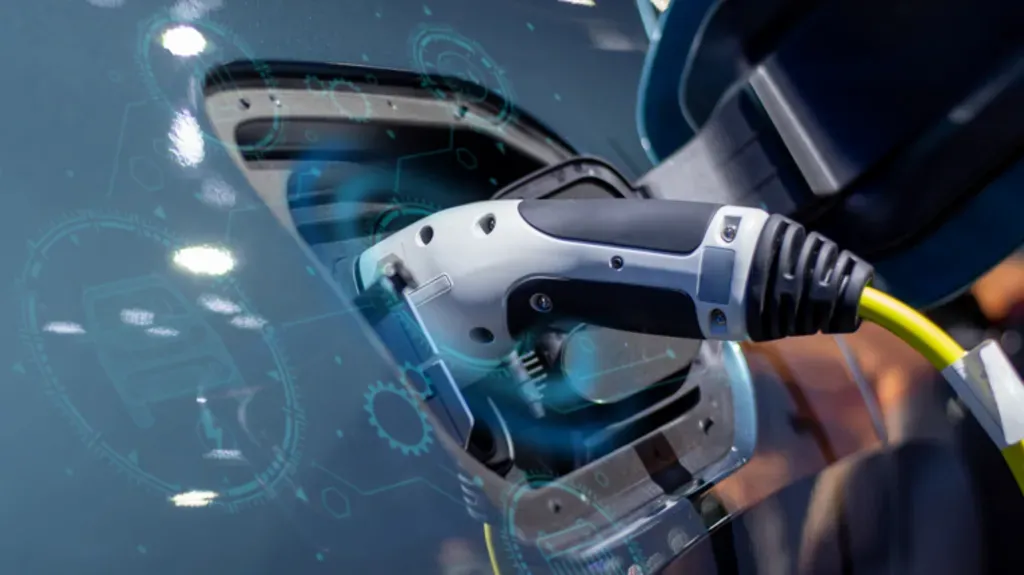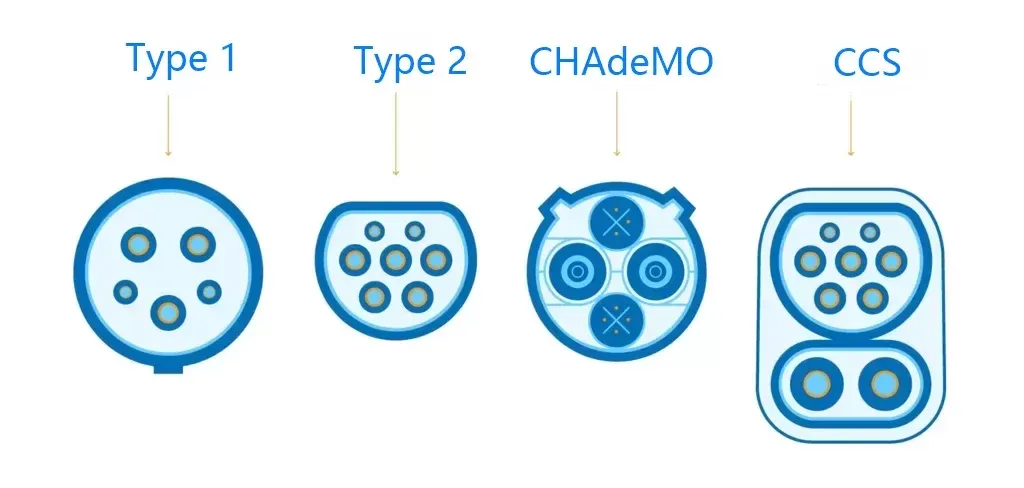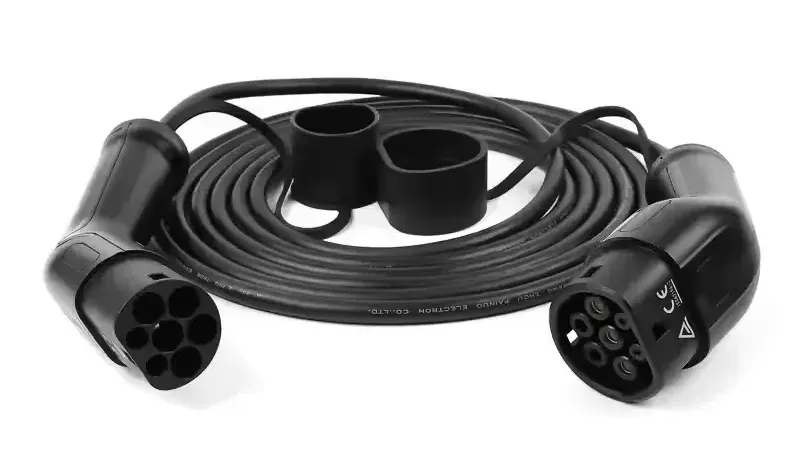How to Choose the Best EV Charging Cables?
On this page
Electric vehicles (EVs) are revolutionizing transportation, and as the demand for EVs grows, so does the need for efficient and reliable charging solutions. One of the key components of EV charging is the charging cable. Choosing the right EV charging cable is essential for ensuring safe, fast, and hassle-free charging. This guide will walk you through the different types of charging plugs, key factors to consider when choosing a cable, and tips for making the best decision for your EV.
 The world of EV charging includes various types of plugs, each designed for different vehicles and charging standards. Generally, there are four main types of charging plugs, divided into AC (Alternating Current) and DC (Direct Current) categories:
Type 1 is a single-phase plug commonly used in American electric vehicles. It can charge at speeds of up to 7.4 kW, making it suitable for home or slow public charging stations. Type 1 plugs are often found on older EV models in North America but are gradually being replaced by Type 2 plugs.
Type 2 is the standard plug for European EVs and is also increasingly used worldwide. This three-phase plug offers faster charging, with speeds up to 22 kW for home charging and up to 43 kW at public charging stations. Type 2 plugs are highly versatile and compatible with a wide range of vehicles.
CHAdeMO is a fast-charging DC plug mostly used in Japanese EVs, such as Nissan and Mitsubishi. It can deliver power up to 100 kW, allowing for rapid charging, making it an excellent option for long-distance travel.
CCS (Combined Charging System) is one of the most common DC charging plugs, particularly in Europe and North America. It combines both AC and DC charging capabilities in a single connector and supports ultra-fast charging up to 350 kW, which is ideal for quick top-ups on the road.
The world of EV charging includes various types of plugs, each designed for different vehicles and charging standards. Generally, there are four main types of charging plugs, divided into AC (Alternating Current) and DC (Direct Current) categories:
Type 1 is a single-phase plug commonly used in American electric vehicles. It can charge at speeds of up to 7.4 kW, making it suitable for home or slow public charging stations. Type 1 plugs are often found on older EV models in North America but are gradually being replaced by Type 2 plugs.
Type 2 is the standard plug for European EVs and is also increasingly used worldwide. This three-phase plug offers faster charging, with speeds up to 22 kW for home charging and up to 43 kW at public charging stations. Type 2 plugs are highly versatile and compatible with a wide range of vehicles.
CHAdeMO is a fast-charging DC plug mostly used in Japanese EVs, such as Nissan and Mitsubishi. It can deliver power up to 100 kW, allowing for rapid charging, making it an excellent option for long-distance travel.
CCS (Combined Charging System) is one of the most common DC charging plugs, particularly in Europe and North America. It combines both AC and DC charging capabilities in a single connector and supports ultra-fast charging up to 350 kW, which is ideal for quick top-ups on the road.
Understanding the type of plug your EV uses is crucial in choosing the right cable, as compatibility is key to efficient and safe charging.
 Selecting the best EV charging cable depends on several factors, including your vehicle's plug type, the length of the cable, and the onboard charging power of your car. Let's break down each of these considerations:
Before purchasing a charging cable, the first and most important step is to determine which connector type your electric vehicle uses. As mentioned earlier, vehicles in different regions or from different manufacturers may use Type 1, Type 2, CHAdeMO, or CCS plugs.
These are most often used for home charging or slower public charging stations. If your vehicle uses Type 1, it will likely be for older models in North America, while Type 2 is the standard for European cars.
These are mainly found at public fast-charging stations. CHAdeMO is favored by Japanese EVs, while CCS is commonly used in Europe and North America for faster charging options.
Selecting the best EV charging cable depends on several factors, including your vehicle's plug type, the length of the cable, and the onboard charging power of your car. Let's break down each of these considerations:
Before purchasing a charging cable, the first and most important step is to determine which connector type your electric vehicle uses. As mentioned earlier, vehicles in different regions or from different manufacturers may use Type 1, Type 2, CHAdeMO, or CCS plugs.
These are most often used for home charging or slower public charging stations. If your vehicle uses Type 1, it will likely be for older models in North America, while Type 2 is the standard for European cars.
These are mainly found at public fast-charging stations. CHAdeMO is favored by Japanese EVs, while CCS is commonly used in Europe and North America for faster charging options.
Make sure to verify your vehicle’s specifications before buying, as the wrong plug type could render your cable incompatible. The length of the charging cable is another vital factor to consider. EV charging cables are typically available in a range of lengths, from 2 meters to 10 meters or more. Choosing the appropriate length depends on your charging setup and how much flexibility you need when parking. If your charging station is in a fixed location, such as a home garage where the EV is parked close to the outlet, a short cable is likely sufficient. Shorter cables are easier to manage, store, and generally cost less. For more flexibility, especially when using public charging points or if you park farther away from the charger, a longer cable may be necessary. However, keep in mind that longer cables are heavier, less convenient to store, and can be pricier.
When choosing cable length, think about your usual parking habits and how far the charging point is from your vehicle. It's always better to have a bit more length than you need to avoid any issues with reaching the outlet.
 The charging power of your car’s onboard charger also determines the maximum speed at which your EV can charge. This is crucial when selecting the right cable, as the charging speed is not only dictated by the cable but also by the power limitations of your car.
Most home chargers operate between 3.7 kW and 22 kW. If your EV can only handle 7.4 kW, for example, it makes no sense to invest in a cable that supports 22 kW, as your car will only charge at the lower rate.
Public fast-charging stations offer much higher power outputs, from 50 kW up to 350 kW. However, your vehicle’s DC charging capability dictates how fast it will charge. If your car can only handle 100 kW, using a 350 kW station won’t speed up the charging process.
The charging power of your car’s onboard charger also determines the maximum speed at which your EV can charge. This is crucial when selecting the right cable, as the charging speed is not only dictated by the cable but also by the power limitations of your car.
Most home chargers operate between 3.7 kW and 22 kW. If your EV can only handle 7.4 kW, for example, it makes no sense to invest in a cable that supports 22 kW, as your car will only charge at the lower rate.
Public fast-charging stations offer much higher power outputs, from 50 kW up to 350 kW. However, your vehicle’s DC charging capability dictates how fast it will charge. If your car can only handle 100 kW, using a 350 kW station won’t speed up the charging process.
When selecting a cable, ensure that its power rating matches your vehicle’s charging capacity. This will help avoid overpaying for unnecessary features and ensure optimal charging performance. Choosing the best EV charging cable involves more than simply picking any cable off the shelf. You need to consider your EV’s plug type, the appropriate cable length for your charging habits, and your car’s onboard charging capacity. With four main types of plugs—Type 1, Type 2, CHAdeMO, and CCS—being aware of your vehicle's specifications is the first step toward making the right choice.
Additionally, selecting the correct cable length and matching the power rating to your car’s capabilities will ensure efficient and convenient charging, whether you’re at home or using a public charging station. By following these guidelines, you’ll be equipped to make an informed decision that guarantees smooth and effective charging for your electric vehicle.
 The world of EV charging includes various types of plugs, each designed for different vehicles and charging standards. Generally, there are four main types of charging plugs, divided into AC (Alternating Current) and DC (Direct Current) categories:
Type 1 is a single-phase plug commonly used in American electric vehicles. It can charge at speeds of up to 7.4 kW, making it suitable for home or slow public charging stations. Type 1 plugs are often found on older EV models in North America but are gradually being replaced by Type 2 plugs.
Type 2 is the standard plug for European EVs and is also increasingly used worldwide. This three-phase plug offers faster charging, with speeds up to 22 kW for home charging and up to 43 kW at public charging stations. Type 2 plugs are highly versatile and compatible with a wide range of vehicles.
CHAdeMO is a fast-charging DC plug mostly used in Japanese EVs, such as Nissan and Mitsubishi. It can deliver power up to 100 kW, allowing for rapid charging, making it an excellent option for long-distance travel.
CCS (Combined Charging System) is one of the most common DC charging plugs, particularly in Europe and North America. It combines both AC and DC charging capabilities in a single connector and supports ultra-fast charging up to 350 kW, which is ideal for quick top-ups on the road.
The world of EV charging includes various types of plugs, each designed for different vehicles and charging standards. Generally, there are four main types of charging plugs, divided into AC (Alternating Current) and DC (Direct Current) categories:
Type 1 is a single-phase plug commonly used in American electric vehicles. It can charge at speeds of up to 7.4 kW, making it suitable for home or slow public charging stations. Type 1 plugs are often found on older EV models in North America but are gradually being replaced by Type 2 plugs.
Type 2 is the standard plug for European EVs and is also increasingly used worldwide. This three-phase plug offers faster charging, with speeds up to 22 kW for home charging and up to 43 kW at public charging stations. Type 2 plugs are highly versatile and compatible with a wide range of vehicles.
CHAdeMO is a fast-charging DC plug mostly used in Japanese EVs, such as Nissan and Mitsubishi. It can deliver power up to 100 kW, allowing for rapid charging, making it an excellent option for long-distance travel.
CCS (Combined Charging System) is one of the most common DC charging plugs, particularly in Europe and North America. It combines both AC and DC charging capabilities in a single connector and supports ultra-fast charging up to 350 kW, which is ideal for quick top-ups on the road.Understanding the type of plug your EV uses is crucial in choosing the right cable, as compatibility is key to efficient and safe charging.
 Selecting the best EV charging cable depends on several factors, including your vehicle's plug type, the length of the cable, and the onboard charging power of your car. Let's break down each of these considerations:
Before purchasing a charging cable, the first and most important step is to determine which connector type your electric vehicle uses. As mentioned earlier, vehicles in different regions or from different manufacturers may use Type 1, Type 2, CHAdeMO, or CCS plugs.
These are most often used for home charging or slower public charging stations. If your vehicle uses Type 1, it will likely be for older models in North America, while Type 2 is the standard for European cars.
These are mainly found at public fast-charging stations. CHAdeMO is favored by Japanese EVs, while CCS is commonly used in Europe and North America for faster charging options.
Selecting the best EV charging cable depends on several factors, including your vehicle's plug type, the length of the cable, and the onboard charging power of your car. Let's break down each of these considerations:
Before purchasing a charging cable, the first and most important step is to determine which connector type your electric vehicle uses. As mentioned earlier, vehicles in different regions or from different manufacturers may use Type 1, Type 2, CHAdeMO, or CCS plugs.
These are most often used for home charging or slower public charging stations. If your vehicle uses Type 1, it will likely be for older models in North America, while Type 2 is the standard for European cars.
These are mainly found at public fast-charging stations. CHAdeMO is favored by Japanese EVs, while CCS is commonly used in Europe and North America for faster charging options.Make sure to verify your vehicle’s specifications before buying, as the wrong plug type could render your cable incompatible. The length of the charging cable is another vital factor to consider. EV charging cables are typically available in a range of lengths, from 2 meters to 10 meters or more. Choosing the appropriate length depends on your charging setup and how much flexibility you need when parking. If your charging station is in a fixed location, such as a home garage where the EV is parked close to the outlet, a short cable is likely sufficient. Shorter cables are easier to manage, store, and generally cost less. For more flexibility, especially when using public charging points or if you park farther away from the charger, a longer cable may be necessary. However, keep in mind that longer cables are heavier, less convenient to store, and can be pricier.
When choosing cable length, think about your usual parking habits and how far the charging point is from your vehicle. It's always better to have a bit more length than you need to avoid any issues with reaching the outlet.
 The charging power of your car’s onboard charger also determines the maximum speed at which your EV can charge. This is crucial when selecting the right cable, as the charging speed is not only dictated by the cable but also by the power limitations of your car.
Most home chargers operate between 3.7 kW and 22 kW. If your EV can only handle 7.4 kW, for example, it makes no sense to invest in a cable that supports 22 kW, as your car will only charge at the lower rate.
Public fast-charging stations offer much higher power outputs, from 50 kW up to 350 kW. However, your vehicle’s DC charging capability dictates how fast it will charge. If your car can only handle 100 kW, using a 350 kW station won’t speed up the charging process.
The charging power of your car’s onboard charger also determines the maximum speed at which your EV can charge. This is crucial when selecting the right cable, as the charging speed is not only dictated by the cable but also by the power limitations of your car.
Most home chargers operate between 3.7 kW and 22 kW. If your EV can only handle 7.4 kW, for example, it makes no sense to invest in a cable that supports 22 kW, as your car will only charge at the lower rate.
Public fast-charging stations offer much higher power outputs, from 50 kW up to 350 kW. However, your vehicle’s DC charging capability dictates how fast it will charge. If your car can only handle 100 kW, using a 350 kW station won’t speed up the charging process.When selecting a cable, ensure that its power rating matches your vehicle’s charging capacity. This will help avoid overpaying for unnecessary features and ensure optimal charging performance. Choosing the best EV charging cable involves more than simply picking any cable off the shelf. You need to consider your EV’s plug type, the appropriate cable length for your charging habits, and your car’s onboard charging capacity. With four main types of plugs—Type 1, Type 2, CHAdeMO, and CCS—being aware of your vehicle's specifications is the first step toward making the right choice.
Additionally, selecting the correct cable length and matching the power rating to your car’s capabilities will ensure efficient and convenient charging, whether you’re at home or using a public charging station. By following these guidelines, you’ll be equipped to make an informed decision that guarantees smooth and effective charging for your electric vehicle.
